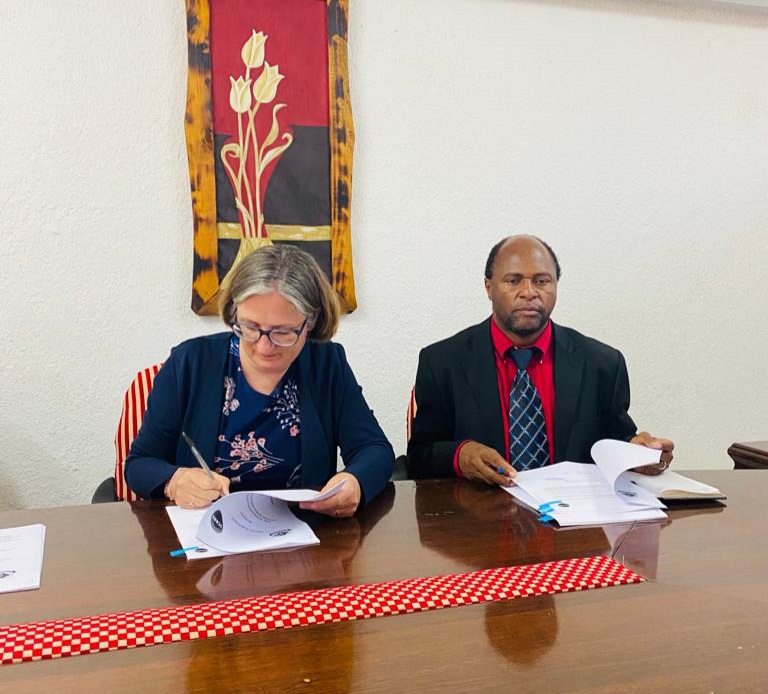Sokoine University of Agriculture (SUA) in collaboration with the Ministry of Livestock and Fisheries and the International Center for Antimicrobial Resistance Solutions (ICARS) of Denmark are implementing two research projects on Optimizing vaccination and biosecurity regimes to enhance fight against AMR in commercial poultry production and Mitigating the spread of antimicrobials and resistant microbes through treatment of manure.
Both projects will be hosted at the Sokoine University of Agriculture (SUA), in Morogoro Tanzania, starting on 1st May 2022 – 30th April 2025 and two grant agreements to solidify this collaboration was signed on 5th April 2022 at the offices of the Ministry of Livestock and Fisheries in Dodoma Tanzania.

The Deputy Minister of Livestock and Fisheries, Hon. Abdallah Ulega (left) welcomes Professor Robinson Mdegela from SUA who is a project leader in his office in Dodoma
Giving a short speech after receiving a report on how the projects will be implemented in the country, the Deputy Minister of Livestock and Fisheries Hon. Abdallah Ulega commended the efforts made and explained how the projects will help farmers positively especially in avoiding the overuse of drugs in poultry production.
Speaking about the projects, Professor Robinson Mdegela from the Sokoine University of Agriculture who is also the project leader noted that SUA and the Ministry of Livestock and Fisheries have written two research projects proposals that aim to look at the possibility of using vaccination and Biosecurity Practices to control poultry diseases thus reducing unnecessary drug use.

ICARS Director of Operations, Ms. Helle Engslund Krarup (left) signing the agreement for the projects, right is Professor Robinson Mdegela from SUA
Professor Mdegela noted that excessive use of drugs in poultry production especially chickens has caused many deaths worldwide and it is estimated that by 2050 more than 10 million people are at risk of dying from poultry products by consuming drugs residues whose effects include Antimicrobial resistance (AMR) which threatens the effective prevention and treatment of an ever-increasing range of infections caused by bacteria, parasites, viruses, and fungi.
[AMR occurs when bacteria, viruses, fungi, and parasites change over time and no longer respond to medicines making infections harder to treat and increasing the risk of disease spread, severe illness and death. As a result, the medicines become ineffective and infections persist in the body, increasing the risk of spread to others]
Professor Mdegela expressed his sincere gratitude to ICARS for agreeing to fund these two projects as it will significantly help save lives as well as improve the livestock sector in the country.
For her part, ICARS Director of Operations Ms. Helle Engslund Krarup insisted that the presence of drug residues in poultry products has now become a major challenge around the world whereby in 2019 more than 5 million people died while southern African countries lost more than 250,000 people.
These were the reasons the Danish government saw fit to work with ICARS and its partners to find a way to address these challenges and we are happy to work in Tanzania with the Ministry of Livestock and Fisheries and the Sokoine University of Agriculture (SUA) - She explained.
Project summaries
Commercial poultry production in Tanzania has an annual growth rate of 6.4% in response to increased demand for eggs and broiler meat. Intensified poultry production comes with increased risk for poultry diseases if proper preventive and control measures are not instituted. To address this challenge, this project seeks to generate evidence at the farm level of how to optimize and increase uptake of vaccine regimes and biosecurity interventions that are both available and relevant, with an economic case for sustainable investment. Read more details
Mitigating the spread of antimicrobials and resistant microbes through treatment of manure
Poultry manure is a desirable fertiliser and is used in crop production, aquaculture, and other food production, which could lead to increased environmental contamination with antimicrobial residues and antimicrobial resistant pathogens and genes across the food chain. This is because antibiotics are often overused in the poultry sector but may not be fully metabolised by poultry and therefore manure can pose risk. This project intends to introduce manure processing technology that will aid in treating manure in Tanzania, leading to safer fertiliser for organic and non-organic products, and ultimately safer food products. It is expected to have an added benefit of creating employment opportunities for small businesses for manure composting and fertiliser sales. Read more details
Story & Photo Credits: Gerald Lwomile – SUAMEDIA




